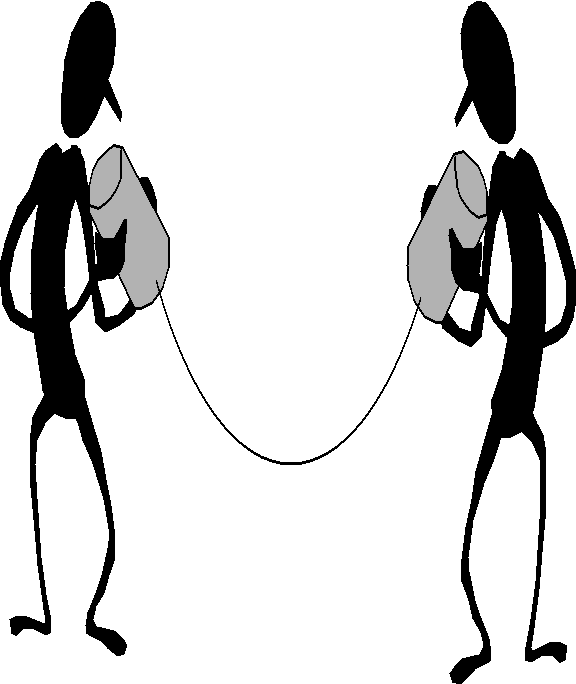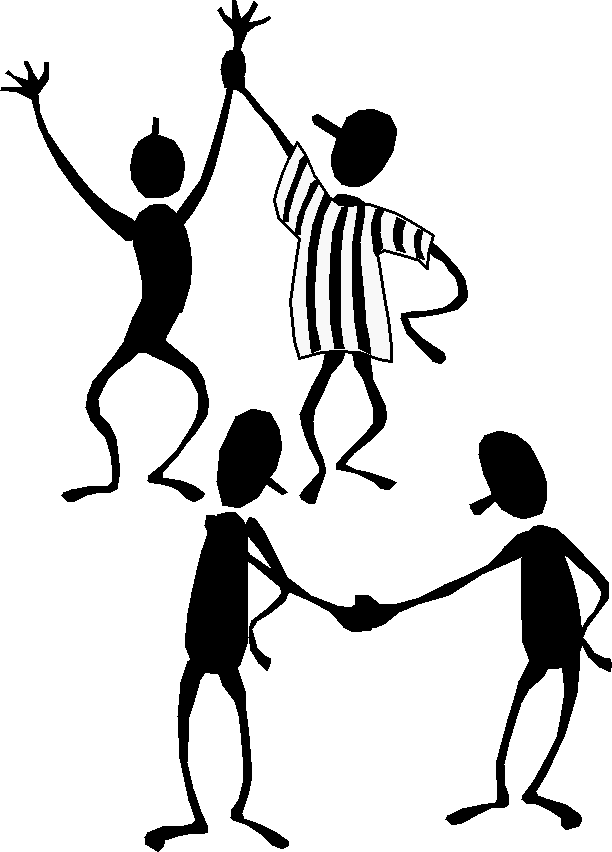A
Few Words about Cooperative Learning in Chemistry
Dr. E.
T. Bell-Loncella
 You're sitting there, wondering, like the little guy to the left, "What's
cooperative learning?" and "why is this page linked to a chemistry class?"
After all, this isn't an education class, is it? It does say Chemistry
at the top of the page!
You're sitting there, wondering, like the little guy to the left, "What's
cooperative learning?" and "why is this page linked to a chemistry class?"
After all, this isn't an education class, is it? It does say Chemistry
at the top of the page!
No, this isn't an education class. Yes, it
is (still) Chemistry. The reason for the handout is that much of
the classroom learning this semester will be done in a cooperative format.
If you have been in one of Dr. Bell-Loncella's classes before, you're already
familiar with this approach; if not, then you might appreciate some introduction.
Cooperative Learning isn't some new phrase coined by the prof, it is a
highly structured form of teaching/learning using groups. Don't get too
comfortable with the idea that you'll get in a group of "brains" and ride
along. In these groups everybody has a job, and everybody works, and the
groups are very heterogeneous (an integrated mix of skills and talents).
If you've never had the opportunity to learn
in a cooperative environment, you are probably wondering why bother. There
is a large body of literature on the structure and benefits of cooperative
learning. The reasons in favor of using cooperative learning are numerous.
Here are a few:
-
Helps you learn interdependence and team-work
skills.
-
Creates an environment where you can promote
each other's successes and support team effort.
-
You learn "group processing".
-
Wonderful opportunity to develop higher order
thinking skills.
-
You learn more and you learn it better.
-
These are the skills that employers are looking
for!
-
Some student responses:
-
You "make friends", "learn to share", "learn
to learn".
-
"Gets the students to learn whether they notice
it or not"
-
"Gave us a chance to get to know other people
who liked chemistry and hear other students' views on how to work problems."
Cooperative learning is based on five basic elements
- which form the acronym "PIGSFace"
Positive interdependence - "We're
all in this together. Either we all sink () or we all swim()". Your group
has mutual goals, joint rewards (group bonus points), shared resources
(one page with the assignment) and assigned roles (see below).
Individual Accountability - Each student's
performance is assessed individually (no group exams!).
Group Processing - As you complete
an assignment you will take a look at "How well did we do?" An honest assessment
makes a winning team.
Social Skills - leadership, decision-making,
trust-building, communication and conflict management
Face-to-face Promotive Interaction
- By default, you will promote each other's learning by helping, hearing,
and encouraging.
There
are a variety of settings in which we will use Cooperative Learning. As
a class you will be divided into groups that change composition (and size)
over the semester. Students tend to sit in small groupings anyway. One
kind of grouping, called Informal Cooperative Learning Groups, uses
this as the starting point. For example, I might "lecture" for a short
period of time. Then I will ask you to turn to your partner and discuss
a question I posed which relates to the material. In this scenario, each
member of the pair must Formulate and individual answer, then Share
their answer with their partner. Each person must Listen carefully
to their partner's answer. Then the pair must
Create a new answer
that is superior to their initial formulation through the process of association,
building on each other's thoughts, and synthesizing. I might randomly call
on a member from several pairs to explain the answer before going on to
another topic.
A more structured task-oriented arrangement would use what are called Formal
Cooperative Learning Groups. Now, the group has a specific size (4
to 6), a specific task (problem of some sort to solve) and each member
has a clearly defined role. PIGS-Face applies very strongly here.
In order to accomplish the group task, each group member must have a role.
There are two general categories, work roles and group roles. These are
discussed below:
-
 Leader/manager
- manages the group and ensured that the members are fulfilling their roles
and working cooperatively.
Leader/manager
- manages the group and ensured that the members are fulfilling their roles
and working cooperatively.
-
Reader - If only one copy of the assignment is
distributed, then one group member reads the instructions, out loud, to
the rest of the group.
-
Recorder - Records group's answers and explanations
along with other pertinent information. Also writes down the group's discussion
and edits the group's report.
-
Technician/Calculator - performs all technical
operations for the group including use of calculator, computer, etc.
-
Reporter or Spokesperson - restates (to the group
or the whole class) the group's major conclusions effectively. The instructor
accepts only the answer given by the Reporter (or sometimes the Recorder).
-
Materials handler - collects materials for the
group (from central position) necessary to accomplish the task.
-
Encourager of participation - ensures that all
members are participating.
-
Checker for understanding - ensures that all group members can explicitly
explain how to arrive at an answer or conclusion.
-
Accuracy coach - corrects any mistakes in another
member's explanations or summaries.
-
Skeptic - makes sure all of the possibilities
have been explored by asking questions like "What other possibilities are
there?" "Let's try to look at this another way." "I'm not sure we're on
the right track."
-
Reflector/observer - Observes and reports on
the group dynamics; keeps track of how well the group cooperates .
How does a Formal Cooperative Learning
Group operate? Your goal is to accomplish a specific task; this may
last just one class period or several weeks. You will work together to
accomplish shared goals. You have two responsibilities: 1) maximize your
learning and 2) maximize the learning of everyone in the group. When we
do work in Cooperative Learning Groups, I will begin by first providing
you instructions and the learning objectives for the assignment. Second,
I will assign everyone to a group, provide you with the necessary materials
and perhaps assign roles for the task. Third I will explain the
task and the cooperative structure (this is different from the first step)
and allow you to work on the project. While you are working I will
monitor the functioning of the different groups and intervene if I see
a need to (a) help you with your cooperative skills and (b) provide assistance
with the academic part of the task --- if needed. Finally, I will
evaluate the quality and quantity of your learning and ensure that your
group conducted a fair self-assessment. Since you are working cooperatively,
when you have a question, you should ask your peers first and then ask
the instructor. When you are working in a group you are expected to interact
with group mates, share ideas and materials, support and encourage each
other's academic achievement, orally explain and elaborate the concepts
and strategies being learned, and hold each other accountable from completing
the assignment.

The most common type of cooperative Learning
assignment will be Problem Solving. You will find that nearly every Cooperative
Learning Problem Solving Lesson has the same basic components.
-
Task - I will explain the task, describe
the problem that you will have to solve.
-
Individual - before you begin working
as a group to solve the problem, each member of the group should try to
estimate an answer. Note especially the strategy (reasoning) you used to
estimate the answer. While it takes more time to do this, it almost always
results in higher quality group work.
-
Cooperative - Now, you can work as a team.
Remember, there must be just one set of answers for the whole group. This
means that you will want to strive for agreement and make sure that everyone
is able to explain the strategies used to solve each problem.
-
Expected criteria for success - Everyone
must be able to explain the strategies used to solve each problem.
-
Evaluation - Best answer within available
resources or constraints. Be prepared discuss the strategies used. As a
group, you should also process how well you have worked together on this
task. Use the idea of "plus/delta": list three things you did well and
one thing you could improve.
-
Individual accountability - One or more
group members will be randomly chosen to explain (a) the answer and (b)
how to solve each problem. Alternatively, each group member will be asked
to explain the group's answers to a member of another group
-
 Expected
behaviors - Active participation, checking, encouraging and elaborating
by all group members.
Expected
behaviors - Active participation, checking, encouraging and elaborating
by all group members.
-
Intergroup cooperation - Whenever it is
helpful, check procedure, answer and strategies with another group.
Group
Assessment
An important part of Cooperative Learning
is the Group Self-Assessment. A winning team constantly strives
to improve. The process of self-assessment is an effective way to build
a winning team. Ultimately this leads to a better functioning group. In
doing a group assessment it is very important to focus on the process
- that is what the group experienced, felt and thought about while working
on the group activity. The Reflector will be responsible for collecting
the group feedback and completing the assessment. While these evaluations
will be collected, they will not be used in any way to assign grades. It
is the Process of Self-Assessment that motivates the group to function
better. The Evaluation has two parts:
To assess participation and learning,
use the following grid to rate yourself on your participation and learning
in this exercise. Also give the (whole) group a rating. Use the scale:
0 = Poor, 1 = Fair, 2 = Good, 3 = Excellent
|
|
Name /
Role
|
Name /
Role
|
Name /
Role
|
Name /
Role
|
Group
|
| Preparation for Activity |
|
|
|
|
|
| Participation in Activity |
|
|
|
|
|
| Quality of Participation |
|
|
|
|
|
| Use of roles |
|
|
|
|
|
| Focus on strategy |
|
|
|
|
|
To assess the process as a group,
answer the questions:
-
What new factual information did we learn today?
-
What are three things we did well in functioning
in a cooperative group?
-
What difficulties did we encounter that hindered
the functioning of our group? How did we solve them?
-
What is one thing that our group could do next
time so we can function better?
Getting Back
Thank you
for visiting this web page.
| Elisabeth T. Bell-Loncella |
|
|
| 112B Engineering & Science Bldg |
|
Department of Chemistry |
| Voice: 814.269.2904 |
etbell@pitt.edu |
University of Pittsburgh at Johnstown |
| FAX: 814.269.7261 |
www.pitt.edu/~etbell |
Johnstown, PA 15904 |
 You're sitting there, wondering, like the little guy to the left, "What's
cooperative learning?" and "why is this page linked to a chemistry class?"
After all, this isn't an education class, is it? It does say Chemistry
at the top of the page!
You're sitting there, wondering, like the little guy to the left, "What's
cooperative learning?" and "why is this page linked to a chemistry class?"
After all, this isn't an education class, is it? It does say Chemistry
at the top of the page!
 You're sitting there, wondering, like the little guy to the left, "What's
cooperative learning?" and "why is this page linked to a chemistry class?"
After all, this isn't an education class, is it? It does say Chemistry
at the top of the page!
You're sitting there, wondering, like the little guy to the left, "What's
cooperative learning?" and "why is this page linked to a chemistry class?"
After all, this isn't an education class, is it? It does say Chemistry
at the top of the page!

 Leader/manager
- manages the group and ensured that the members are fulfilling their roles
and working cooperatively.
Leader/manager
- manages the group and ensured that the members are fulfilling their roles
and working cooperatively.
 Expected
behaviors - Active participation, checking, encouraging and elaborating
by all group members.
Expected
behaviors - Active participation, checking, encouraging and elaborating
by all group members.